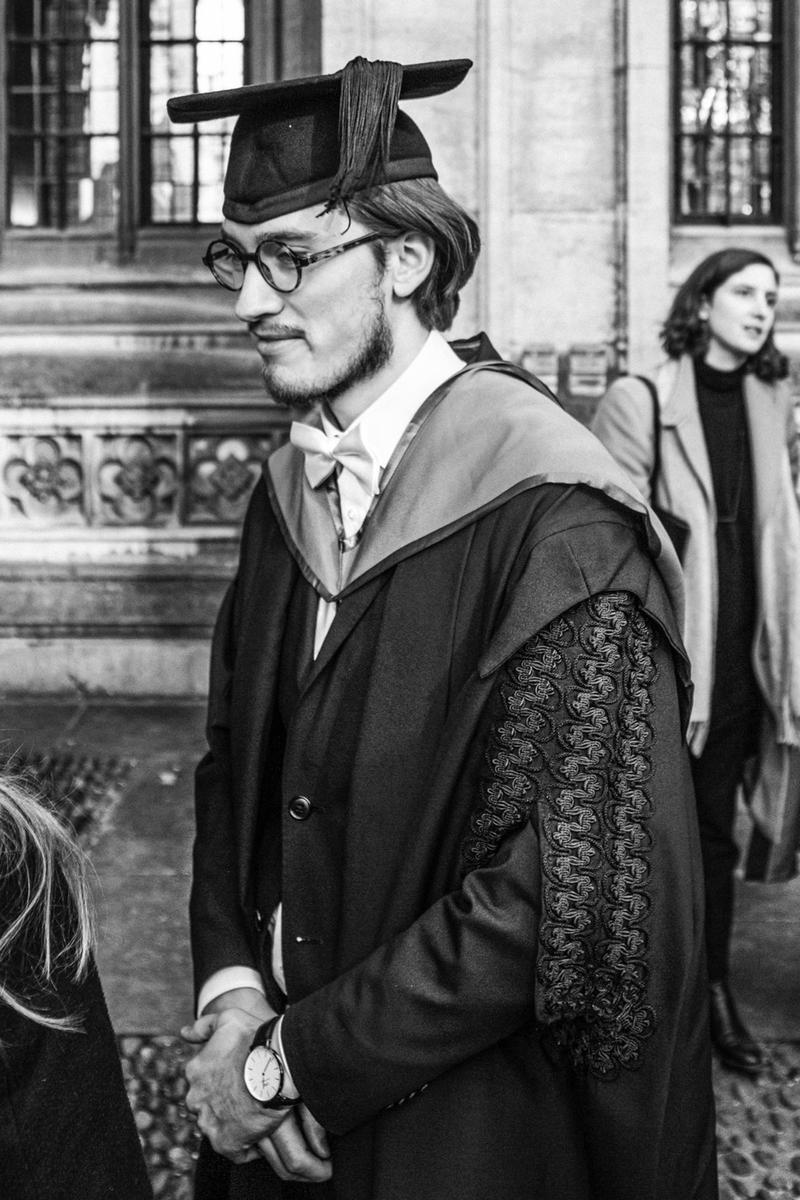DPhil Student Spotlight: Clemens Jarnach
DPhil Student Spotlight: Clemens Jarnach
Clemens began his DPhil in 2018, after completing an MSc in Sociology with the Department. He is supervised by Professor Stephen Fisher and is a member of Green Templeton College.

Why do you study Sociology?
I come from an interdisciplinary background, starting with an undergraduate degree in business and finance.
However, my interests soon shifted towards research and social science, leading me to pursue an MSc in Sociology at Oxford. Ultimately, the subjects that interest me motivate my work.
1. I am fascinated by the mechanisms of opinion formation and exploring how individuals decide on their voting preferences, party affiliations, and support for politicians. This involves studying various influences on opinion formation, including media, social networks, and the social environment, while also considering cognitive processes and biases.
2. Brexit stands out as a highly significant political event in Britain's recent history, impacting people not only in the UK but also in the European member states. Understanding the motivations behind people's votes and unravelling the puzzles surrounding this issue continues to intrigue me.
3. Lastly, I have a keen interest in applying and developing innovative approaches, research designs, and methods to sociological questions. Using large-scale survey data along with digital trace and behavioural data through computational quantitative methods is particularly rewarding.
This approach not only provides interesting and meaningful insights into individual behaviour and society at large, but also involves taking on new challenges and helping to drive computational social science forward.
What first attracted you to the Department?
The opportunity to work with, hear from, and learn from key scholars in the field was a major draw.
Oxford's reputation for academic rigor and intellectual vitality is unparalleled, and I knew that being part of such a prestigious institution would provide an environment conducive to high-level research and scholarship.
I would be lying if I said that Oxford's rich history wasn’t a factor in my decision to apply. The allure of walking the same halls as some of the greatest minds in history was irresistible. The university's legacy is not just a backdrop but an inspiration, fuelling my academic pursuits with a sense of belonging to a grand tradition.
The most important reason for me, however, was the feeling that I would fit into both the University and the Department. From my interactions with faculty members to the structure of the programme, everything resonated with my academic goals and personal aspirations.
I felt that Oxford would be the best place for me to develop my research, offering the perfect balance of support, resources, and intellectual challenge.
What do you enjoy most about studying in Oxford?
Living and studying in Oxford has been an enriching experience, both academically and personally. The most wonderful aspect of my time here is the vibrant intellectual community. Imagine being constantly surrounded by brilliant minds - this environment is both stimulating and challenging.
Oxford's charm lies in its harmonious blend of tradition and innovation. On the one hand, the University is an institution steeped in centuries-old traditions, each a thread that weaves together a sense of continuity and an almost tangible connection to the past.
Yet, Oxford is a dynamic force at the forefront of cutting-edge research and progressive thought.

Clemens during his MSc graduation
What are your research interests?
I research political sociology, political polarisation, public opinion, cognitive biases, and the impact of (digital and offline) media on public opinion.
My current research focuses on understanding the complexity behind public opinion formation, including political attitudes and political identity, and examines the key drivers behind it.
Do the internet, traditional news sources, or our social network have the greatest influence on us?
What are you currently working on?
My doctoral thesis specifically explores the relationship between political engagement and media usage in the context of British politics, using network theory and a computational social science approach to examine political sociology questions. I see myself as a computational social scientist who takes sociological theory very seriously.
In summary, my research investigates the nuanced impact of different information sources on public opinion. The origin of information plays a crucial role, as consuming news through various channels—social media, online newspapers, or television—exerts distinct effects on the formation of public opinion and voting decisions.
The internet is predominantly used by younger and more educated individuals, leading to diverse voting associations compared to traditional television use.
But, my investigation suggests not only the presence of observed correlations but also causal distinctions. For instance, the consumption of internet news appears to have a different and varying intensity of influence on voting behaviour when compared to activities like radio listening.
Notable trends indicate that television news consumption correlates with an increased likelihood of voting in favour of leaving the EU in the referendum and supporting the Conservative party in subsequent general elections.
Conversely, the use of social media demonstrates opposing effects, with increased social media news consumption associated with a higher likelihood of voting to remain in the EU and supporting the Labour party in subsequent elections.
However, the narrative is even more intricate, as the impact of media consumption is heavily contingent on the user's predisposition - individuals tend to seek balance and consistency in their attitudes, beliefs, and behaviours.
Consequently, individuals select media outlets and sources aligning with their existing political attitudes, creating a reinforcing feedback loop, particularly noticeable in newspaper consumption. Those inclined to vote for a conservative party tend to choose, read, and remember news that aligns with their pro-conservative views, thereby perpetuating and strengthening their conservative leanings.
What do you hope to do when you finish your course?
My primary career objective is to pursue an academic career in the area of political sociology, social networks, and computational social science.
I would like to keep adding to our understanding of public opinion formation, the influences of information and social networks on political behaviour, and the dynamics of political polarisation.
However, I can also envision applying my research skills in policy-oriented settings.
What piece of advice would you give to prospective students?
I would advise anyone considering a PhD to choose a topic carefully, selecting something you are passionate about.
Secondly, identify the best supervisor and reach out early. Your supervisor may be the only other person actively supporting you, so ensure they are willing to do so.
If you find a supervisor who shares the same passion for your project as you do, your PhD journey can be so much more rewarding.
What hobbies do you have outside of sociology?
To take my mind off my PhD work I either spend time with my family or do some creative work as a photographer (you can find my work here.) Besides that, I am a passionate hiker and mountaineer.
You can get in touch with Clemens via email or find out more on his website.


